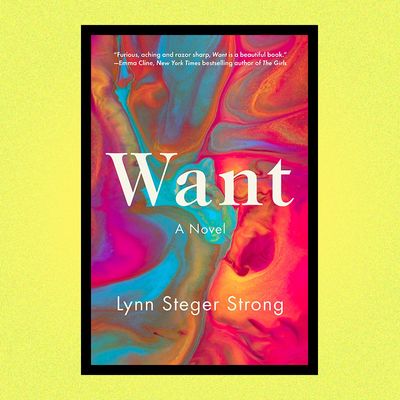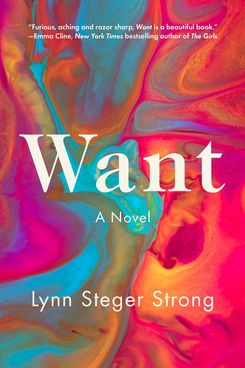
ItÔÇÖs the typical American Dream story. A young Brooklyn husband and wife are ambitious and in love. Then, when she is in grad school, they accidentally conceive. Another baby follows two years later. One-hundred thousand dollars in student loans, a $30,000 hospital bill for an unplanned C-section, and dental bills land them squarely into the kind of debt that hovers over your shoulder like a needling specter. They file for bankruptcy. But the grueling juggle of a life without wiggle room ÔÇö feverish toddlers who require nonexistent sick days, clankety delayed trains, sharp stabs of fear about the impossibility of continued existence ÔÇö traps them. If all this sounds, well, unpleasant, then I must say I agree with you. But Lynn Steger StrongÔÇÖs Want is a defining novel of our age of left-behind families.
The narrator, 34-year-old Elizabeth, teaches a college course and works at a high school for ÔÇ£at-riskÔÇØ (read: minority) students, a place where the CEO drives home the educational mission of ÔÇ£joyfully drivenÔÇØ work with an iron fist. Neither pays a living wage. Like Strong, whose life closely mirrors ElizabethÔÇÖs, sheÔÇÖs a part of the new genteel poverty, that class of┬á20-, 30-, 40-something adults raised to delusional cries like ÔÇ£Find your passion!ÔÇØ and ÔÇ£Do what you love and youÔÇÖll never work a day in your life!ÔÇØ ÔÇö who now string together a slew of jobs, forever tired. All that hypothetical promise gone. They shunned corporate Manhattan, proud to work with their hands. ÔÇ£We were eighties babies,ÔÇØ Elizabeth explains, ÔÇ£born of plenty, cloistered by our whiteness and the places we were raised ÔǪ we were both brought up to think that if we checked off certain boxes weÔÇÖd be fine.ÔÇØ She has an Ivy League Ph.D. and impressive literary bona fides but no career. Her husband left finance when Lehman Brothers imploded and then turned to a straggling carpentry business.
The ground beneath her is compressed powder, crumbling with every step. SheÔÇÖs a knowingly half-engaged teacher. She shovels chips into her daughtersÔÇÖ hands and sends them off to watch TV for the smallest break from responsibility. Every little thing is hard. A loaf of challah bread meant to last a week is gone in hours, and she panics. In a moment of clarity, Elizabeth thinks, ÔÇ£We cannot live outside the systems and the structures, but, it turns out, I cannot live within them either anymore.ÔÇØ By the time of its publication this July, four months into unemployment numbers so obscene that theyÔÇÖll be meaningless, Want doesnÔÇÖt feel so far off from the lives many Americans have been living every day.
WantÔÇÖs narrator is white, a creative, Brooklyn-based: the three horsemen of our decadeÔÇÖs literary apocalypse, in which an obnoxious percentage of literary fiction dotes on characters you couldnÔÇÖt tell apart in a Carroll Gardens precinct line-up. Elizabeth knows exactly where she hovers on the food chain of people with hard lives. She comes from money, though her father says that a loan of any kind ÔÇ£would be like throwing it away.ÔÇØ Want spiritually strides away from its western Brooklyn kin as quickly as possible; though ElizabethÔÇÖs kids attend birthday parties in Remodelista brownstones, that is not their world. Its characters occupy a hazy gray zone where more successful friends invite them out for $22 gin martinis, but paying for three of their own drinks would deplete their bank account entirely. This is a new middle class, not actually a middle class at all, but a static hell of depleted expectations and small indecencies, as if Anne Helen PetersenÔÇÖs viral burnout article and John SteinbeckÔÇÖs oeuvre had a baby. ElizabethÔÇÖs family is close enough to the privileged worlds of backyard swimming pools and $48 steaks to wonder constantly if a small turn in luck might reinstate them higher on the heap, but one root canal away from missed rent and a forced move.
Summer 2020 is cursed. Debut novelists will watch their long-treasured first babies sink like stones into the coronavirus news-cycle mire, and more established writers like Strong, with novels poised to break them into the big leagues, wonÔÇÖt have an easy go of it, either. ItÔÇÖs hard right now to settle in with any story that lurches you into a world you know is artificial, one where the problems seem so remote.
But Want, which is being passed practically hand to hand (if such a thing could happen) among book-industry friends, is an ideal sample of how to produce fiction that is timely and timeless. Elizabeth wouldnÔÇÖt be surprised by the stick of dynamite the coronavirus has implanted in our economy. Just another setback in a life full of them. ItÔÇÖs appeal right now may have something to do with the ways it thoughtfully plays with autofiction, darting in with details from StrongÔÇÖs real life, then knowingly inflating and reshaping plot points, a wise reimagining of what we can do with our own stories. (Strong, I know from some of her Guardian columns, may lose her apartment in the coming months and has contemplated moving her family to a campsite in Maine.) But itÔÇÖs also due to the prose ÔÇö liquid, tender, fluttering ÔÇö which keeps this story easy, perhaps too easy, to read. ItÔÇÖs an odd pleasure ÔÇö a difficult story that is winningly told. YouÔÇÖll feel guilty for enjoying it as much as you do.


